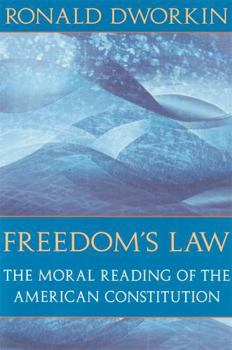Freedom's Law: The Moral Reading of the American Constitution
Select Format
Select Condition 
Book Overview
Ronald Dworkin argues that Americans have been systematically misled about what their Constitution is, and how judges decide what it means. The Constitution, he observes, grants individual rights in extremely abstract terms. The First Amendment prohibits the passing of laws that "abridge the freedom of speech"; the Fifth Amendment insists on "due process of law"; and the Fourteenth Amendment demands "equal protection of the laws" for all persons. What does that abstract language mean when it is applied to the political controversies that divide Americans--about affirmative action and racial justice, abortion, euthanasia, capital punishment, censorship, pornography, and homosexuality, for example? Judges, and ultimately the justices of the Supreme Court, must decide for everyone, and that gives them great power. How should they decide? Dworkin defends a particular answer to that question, which he calls the "moral reading" of the Constitution. He argues that the Bill of Rights must be understood as setting out general moral principles about liberty and equality and dignity, and that private citizens, lawyers, and finally judges must interpret and apply those general principles by posing and trying to answer more concrete moral questions. Is freedom to choose abortion really a basic moral right and would curtailing that right be a deep injustice, for example? Why? In the detailed discussions of individual constitutional issues that form the bulk of the book, Dworkin shows that our judges do decide hard constitutional cases by posing and answering such concrete moral questions. Indeed he shows that that is the only way they can decide those cases. But most judges--and most politicians and most law professors--pretend otherwise. They say that judges must never treat constitutional issues as moral issues because that would be "undemocratic"--it would mean that judges were substituting their own moral convictions for those of Congressmen and state legislators who had been elected by the people. So they insist that judges can, and should, decide in some more mechanical way which involves no fresh moral judgment on their part. The result, Dworkin shows, has been great constitutional confusion. Is the premise at the core of this confusion really sound? Is the moral reading--the only reading of the American Constitution that makes sense--really undemocratic? In spirited and illuminating discussions both of the great constitutional cases of recent years, and of general constitutional principles, Dworkin argues, to the contrary, that the distinctly American version of government under principle, based on the moral reading of the Constitution, is in fact the best account of what democracy really is.
Format:Paperback
Language:English
ISBN:0674319281
ISBN13:9780674319288
Release Date:April 1997
Publisher:Harvard University Press
Length:416 Pages
Weight:1.10 lbs.
Dimensions:1.0" x 6.1" x 9.3"
Customer Reviews
3 ratings
Why the Supreme Court is Wrong
Published by Thriftbooks.com User , 21 years ago
One of the country's leading legal philosophers collects a series of essays (most originally appearing in the New York Review of Books) which examine the ... basis for the United States Constitution, and attack the "original intent" interpretation, most famously spouted by Bork.The book's strength is Dworkin's accessible writing style (which may stem from the popular press origins of most of these essays) and his tight analysis of several cutting edge issues--abortion, affirmative action, free speech, as well as some historically important battles--the Bork and Thomas nominations.His bottom line is (although he does not say this explicitly) that the recent Supreme Court, abbeted by a series of Republican presidents, has begun a revolution in legal thinking which rejects the 200 year old liberal tradition of judicial interpretation, and in the process has substituted results based, conservative politics for any semblance of judicial reasoning.The weakness of the book is that many examples and arguments are repeated between essays, covering the same ground in virtually the same words from different times.A much easier read than "Taking Rights Seriously", although the latter clearly is a more complete exposition of Dworkin's philosophy.For a counter argument, see any of Judge Posner's recent work, which explicitly takes on Dworkin's philosophy.
A Legal Classic
Published by Thriftbooks.com User , 22 years ago
Ronald Dworkin is perhaps today's Bentham. His views on Constitutional Interpretation in this book are so vividly written and lucidly explained. His views on Judicial Activism equating it with natural interpretation are worth considering if not fully acceptable.
Old Ideas for Re-Discussion
Published by Thriftbooks.com User , 26 years ago
Since this book consists of occasional pieces collected under a common rubric, it's persuasive thrust will find its target in a readership that is already sympathetic to Dworkin's legal and political philosophy. The arguments are not finely made, as they are in, say, *Taking Rights Seriously*, or in *Life's Dominion*. Many of the illustrative parables he uses, he's used before. That being said, *Freedom's Law* is a good collection highlighting the contours of Dworkin's fundamental objections to legal positivism. I think it is possible to follow Dworkin's non-interpretivist method without arriving at the same(moral)conclusions. But if you aren't already familiar with Dworkin's intellectual base of operations, a better place to start would be *Taking Rights Seriously* (easy to find) or, even better, his early and very important essay, "Is Law a System of Rules?" reprinted in *The Philosophy of Law* ed. by Dworkin (harder to find). To his credit, in this latter collection, he gives ample space to views contrary to his own, such as Hart's positivism, and Finnis' moral arguments against abortion.






